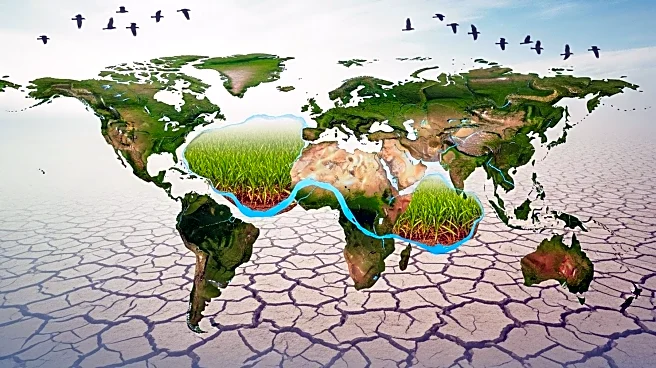What's Happening?
A recent report by the World Meteorological Organization (WMO) highlights that only a third of the world's river basins experienced normal conditions in 2024 due to the climate crisis. The erratic water cycle has led to extremes of drought and flooding, causing significant societal and governmental challenges. These disruptions have resulted in food scarcity, poor crop yields, and rising prices, with some regions facing tensions and migration. The report notes that last year was the hottest on record, with severe droughts affecting the Amazon basin and parts of North America, Africa, and Mexico. Meanwhile, regions like Central Europe, Russia, Pakistan, and northern India experienced heavy flooding. The report also mentions the loss of ice mass in glaciers across various regions, contributing to sea level rise.
Why It's Important?
The findings underscore the urgent need for global action to address the impacts of climate change on water resources. The disturbances in natural water cycles are not only affecting food security but also leading to economic and social instability in vulnerable regions. Governments are urged to take proactive measures, such as reducing greenhouse gas emissions, improving water storage, and adapting farming techniques to mitigate these effects. The report warns that without sufficient political attention and investment in preparation, the costs to society will increase in the future. The situation highlights the interconnectedness of environmental issues with economic and social challenges, emphasizing the need for comprehensive policy responses.
What's Next?
The report suggests several measures that governments could implement to reduce the impact of extreme water cycle swings. These include building reservoirs, restoring wetlands, and enhancing early warning systems for severe weather events. Cooperation among governments is crucial to improve preparation and response strategies. The authors stress the importance of viewing investments in climate adaptation as valuable for society, urging immediate action to prevent future costs. The focus will likely be on encouraging international collaboration and policy development to address these pressing environmental challenges.
Beyond the Headlines
The report's findings may lead to increased discussions on the ethical and legal responsibilities of nations in addressing climate change. The long-term implications could include shifts in global migration patterns and changes in agricultural practices. There may also be cultural impacts as communities adapt to new environmental realities. The emphasis on proactive measures highlights the need for a shift in how governments prioritize and invest in climate resilience.









